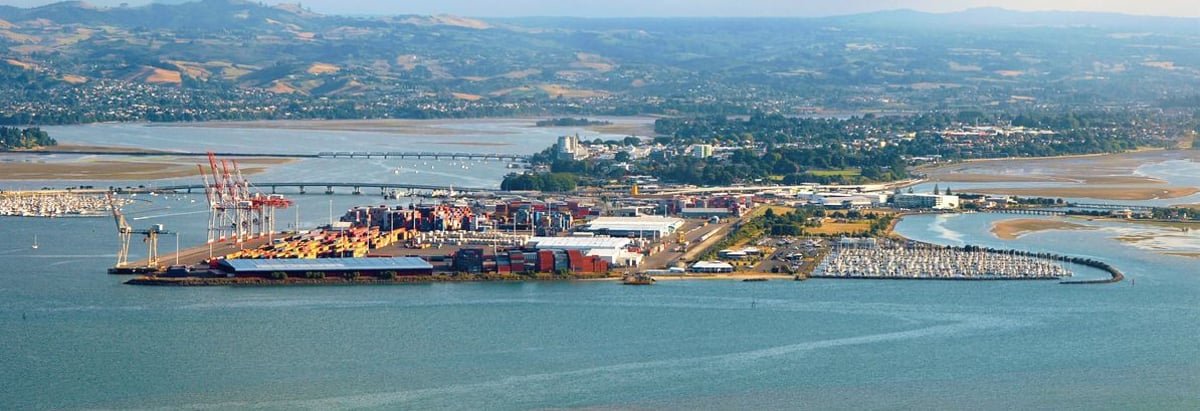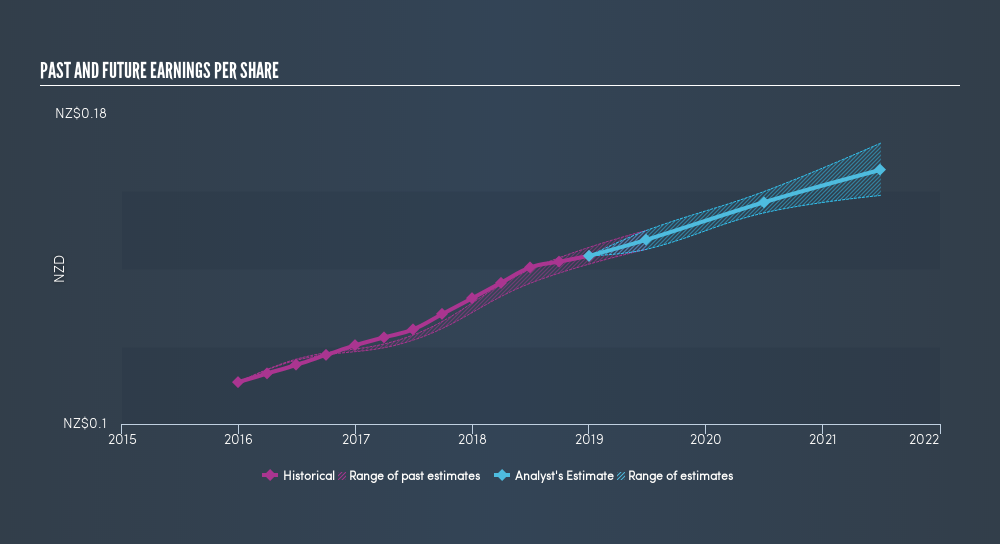
Generally speaking the aim of active stock picking is to find companies that provide returns that are superior to the market average. Buying under-rated businesses is one path to excess returns. To wit, the Port of Tauranga share price has climbed 97% in five years, easily topping the market return of 43% (ignoring dividends). On the other hand, the more recent gains haven't been so impressive, with shareholders gaining just 12%, including dividends.
View our latest analysis for Port of Tauranga
In his essay The Superinvestors of Graham-and-Doddsville Warren Buffett described how share prices do not always rationally reflect the value of a business. One imperfect but simple way to consider how the market perception of a company has shifted is to compare the change in the earnings per share (EPS) with the share price movement.
During five years of share price growth, Port of Tauranga achieved compound earnings per share (EPS) growth of 4.5% per year. This EPS growth is slower than the share price growth of 14% per year, over the same period. So it's fair to assume the market has a higher opinion of the business than it did five years ago. And that's hardly shocking given the track record of growth.
The graphic below depicts how EPS has changed over time (unveil the exact values by clicking on the image).

This free interactive report on Port of Tauranga's earnings, revenue and cash flow is a great place to start, if you want to investigate the stock further.
What About Dividends?
When looking at investment returns, it is important to consider the difference between total shareholder return (TSR) and share price return. The TSR is a return calculation that accounts for the value of cash dividends (assuming that any dividend received was reinvested) and the calculated value of any discounted capital raisings. Arguably, the TSR gives a more comprehensive picture of the return generated by a stock. As it happens, Port of Tauranga's TSR for the last 5 years was 141%, which exceeds the share price return mentioned earlier. And there's no prize for guessing that the dividend payments largely explain the divergence!
A Different Perspective
It's nice to see that Port of Tauranga shareholders have received a total shareholder return of 12% over the last year. That's including the dividend. However, that falls short of the 19% TSR per annum it has made for shareholders, each year, over five years. The pessimistic view would be that be that the stock has its best days behind it, but on the other hand the price might simply be moderating while the business itself continues to execute. Before forming an opinion on Port of Tauranga you might want to consider the cold hard cash it pays as a dividend. This freechart tracks its dividend over time.
If you like to buy stocks alongside management, then you might just love this freelist of companies. (Hint: insiders have been buying them).
Please note, the market returns quoted in this article reflect the market weighted average returns of stocks that currently trade on NZ exchanges.We aim to bring you long-term focused research analysis driven by fundamental data. Note that our analysis may not factor in the latest price-sensitive company announcements or qualitative material.
If you spot an error that warrants correction, please contact the editor at editorial-team@simplywallst.com. This article by Simply Wall St is general in nature. It does not constitute a recommendation to buy or sell any stock, and does not take account of your objectives, or your financial situation. Simply Wall St has no position in the stocks mentioned. Thank you for reading.
About NZSE:POT
Port of Tauranga
A port company, provides and manages port services and cargo handling facilities through the Port of Tauranga, MetroPort, and Timaru Container Terminal in New Zealand.
Adequate balance sheet with acceptable track record.
Market Insights
Community Narratives



